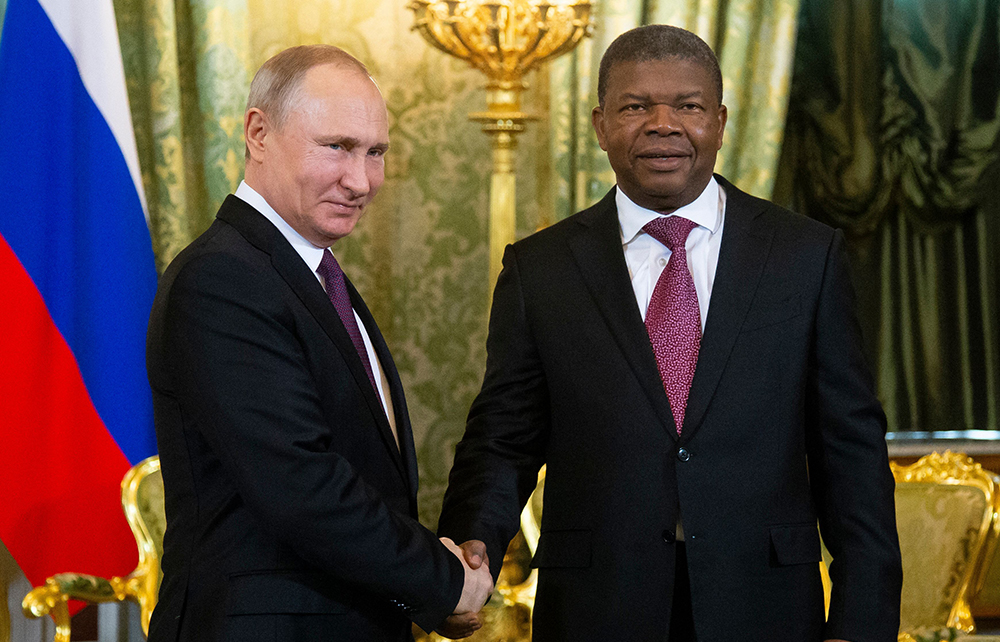On the lengthy train ride to Kyiv I read my Plokhy as we trundled through seas of mud, passing villages with blue timber churches topped by golden domes gleaming in the spring dawn. A metastasis of Putin’s atrocities against Ukraine has been the entrenching of Russian influence, powered by guns and agitprop, across my home continent of Africa. I wanted to hear what people in Kyiv thought about this trend, since it threatens to roll back democracy in Africa three decades after the Soviet Union collapsed. Look at Africa’s UN voting patterns, what many Africans are saying, at the sudden appearance of Russian goons in the remotest corners and at the convergence of Chinese and Vatnik rhetoric. I am no longer so enthusiastic about Africa taking the side of western powers like Britain, which has failed so badly to support the rule of law, trade and investment in poor countries. What I fear is that a sovereign Africa is about to find itself on the wrong side of history and most ordinary Africans want progress rather than to be dosed with the Rohypnol of Putin’s lies.
In Kyiv I expected to meet a beleaguered people. During Orthodox mass, I searched faces for expressions of grief and fear as they bowed to kiss their icons. Instead I saw faces that were resolute, calm. I found relatives quietly paying respects to fallen family members on the city wall of photos that extends back not just to the last year of fighting, but all the way to 2014. Instead of pitying Ukrainians I found myself envying the clarity of their determination to survive and win. Here in Kyiv, people were at the heart of the struggle between liberty and violent despotism. No loss of confidence, no strike actions, no long Covid or working from home, no garbage in the streets, no unhappiness about one’s identity. I came away feeling privileged to have been among a people invigorated by moral certainties.
Most Ukrainians I met appeared to be volunteering time and money to the war effort: one developed kamikaze drones, another donated Celox coagulant for gunshot wounds, and one has a team harvesting Russian soldiers’ numbers which they use to call home to announce their sons and husbands are dead – but the good news is they get a bonus of 10,000 rubles at the local base. (Mayhem ensues.) Zhenya, a chef who owns ramen noodle restaurants in Kyiv, has cooked more than 700,000 meals for front line troops since the early days of the Russian onslaught against the capital. The front line, he explains, has more than a million people deployed across a stretch of 2,500 km and the rations required mean they need 136,000 tons of meat every day. Talking to him, I began to see how difficult it was to persuade anybody to think about the war beyond Ukraine, especially to think about Africa. But at the foreign ministry they told me that Ukraine is gifting dozens of shiploads of wheat to starving Africans in drought- and war-beset countries, something Russia is not doing, and yet so little credit goes to Kyiv for this effort.
While in Kyiv one surprise for me was the dislike many Ukrainians expressed for Zelensky, who despite being a hero overseas is regarded as being a defective figurehead leading a government that was both corrupt and feckless in the face of the Russian onslaught against the capital city last year. People love the military command but they claimed that Kyiv was rescued by a popular mobilisation, while the civilian government dithered, and that this is a story that continues in the east. One anticipates that if the Russians are defeated, the Ukrainians will once again quarrel among themselves.
On my last evening I had supper with Putin’s former economic adviser Andrey Illarionov, who said that even if Ukraine recaptures all its territory this year, Putin will regroup, rearm and attack again. There will be no palace coup. Putin will have to be defeated in Moscow. ‘Doesn’t that mean nuclear war?’ I asked. ‘No,’ says Illarionov, who argued China would never allow it. We were in Musafir, an excellent Crimean Tatar restaurant. Others at the table included a general who helped defend Kyiv last year, an Orthodox priest who likes blowing up tanks with NLAWs, and a Ukrainian veteran of the US special forces.
During my short stay in Ukraine I did get a better understanding of how to tell the story of Russia’s aggression to the African public, but whereas Kyiv’s resources are so limited to do this – and the West is so mean – Moscow has boundless energy and resources to pervert the course of the future in Africa. With Africa at the gates of Europe, we should all be very worried about that. On my departure at the train station I was surrounded by young soldiers stuffing cigarettes in their backpacks, pumped up for combat and departing for the east. In the dim light hundreds of women were kissing their men, smothering their faces with kisses, but in this operatic scene I saw none crying.
Readers who wish to donate to Ukraine’s fighting soldiers’ rations can contact the chef Zhenya at www.magicfoodarmy.com







Comments